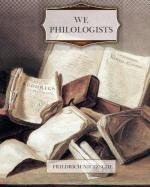183
If, then, the Romans had spurned the Greek culture, they would perhaps have gone to pieces completely. When could this culture have once again arisen? Christianity and Romans and barbarians: this would have been an onslaught: it would have entirely wiped out culture. We see the danger amid which genius lives. Cicero was one of the greatest benefactors of humanity, even in his own time.
There is no “Providence” for genius; it is only for the ordinary run of people and their wants that such a thing exists: they find their satisfaction, and later on their justification.
184
Thesis: the death of ancient culture inevitable. Greek culture must be distinguished as the archetype; and it must be shown how all culture rests upon shaky conceptions.
The dangerous meaning of art: as the protectress and galvanisation of dead and dying conceptions; history, in so far as it wishes to restore to us feelings which we have overcome. To feel “historically” or “just” towards what is already past, is only possible when we have risen above it. But the danger in the adoption of the feelings necessary for this is very great . let the dead bury their dead, so that we ourselves may not come under the influence of the smell of the corpses.
THE DEATH OF THE OLD CULTURE.
1. The signification of the studies of antiquity hitherto pursued: obscure; mendacious.
2. As soon as they recognise the goal they condemn themselves to death . for their goal is to describe ancient culture itself as one to be demolished.
3. The collection of all the conceptions out of which Hellenic culture has grown up. Criticism of religion, art, society, state, morals.
4. Christianity is likewise denied.
5. Art and history—dangerous.
6. The replacing of the study of antiquity which has become superfluous for the training of our youth.
Thus the task of the science of history is completed and it itself has become superfluous, if the entire inward continuous circle of past efforts has been condemned. Its place must be taken by the science of the future.
185
“Signs” and “miracles” are not believed; only a “Providence” stands in need of such things. There is no help to be found either in prayer or asceticism or in “vision.” If all these things constitute religion, then there is no more religion for me.
My religion, if I can still apply this name to something, lies in the work of breeding genius . from such training everything is to be hoped. All consolation comes from art. Education is love for the offspring; an excess of love over and beyond our self-love. Religion is “love beyond ourselves.” The work of art is the model of such a love beyond ourselves, and a perfect model at that.
186
The stupidity of the will is Schopenhauer’s greatest thought, if thoughts be judged from the standpoint of power. We can see in Hartmann how he juggled away this thought. Nobody will ever call something stupid—God.




